Ethical Considerations: Advocating for New Treatment in Healthcare
VerifiedAdded on 2023/06/18
|8
|1884
|266
Essay
AI Summary
This essay explores the ethical responsibilities of healthcare professionals in advocating for the introduction of new treatments and technologies within healthcare. It emphasizes the importance of bioethical principles such as beneficence, non-maleficence, autonomy, and justice in ensuring patient well-being and ethical practice. The essay also considers other ethical concepts, including utilitarian, deontological, and virtue ethics, as well as human dignity, veracity, and professional codes, to provide a comprehensive overview of the ethical considerations involved in integrating new healthcare innovations. The conclusion reinforces the need for evidence-based treatments, patient consent, and adherence to ethical practices to promote positive health outcomes.
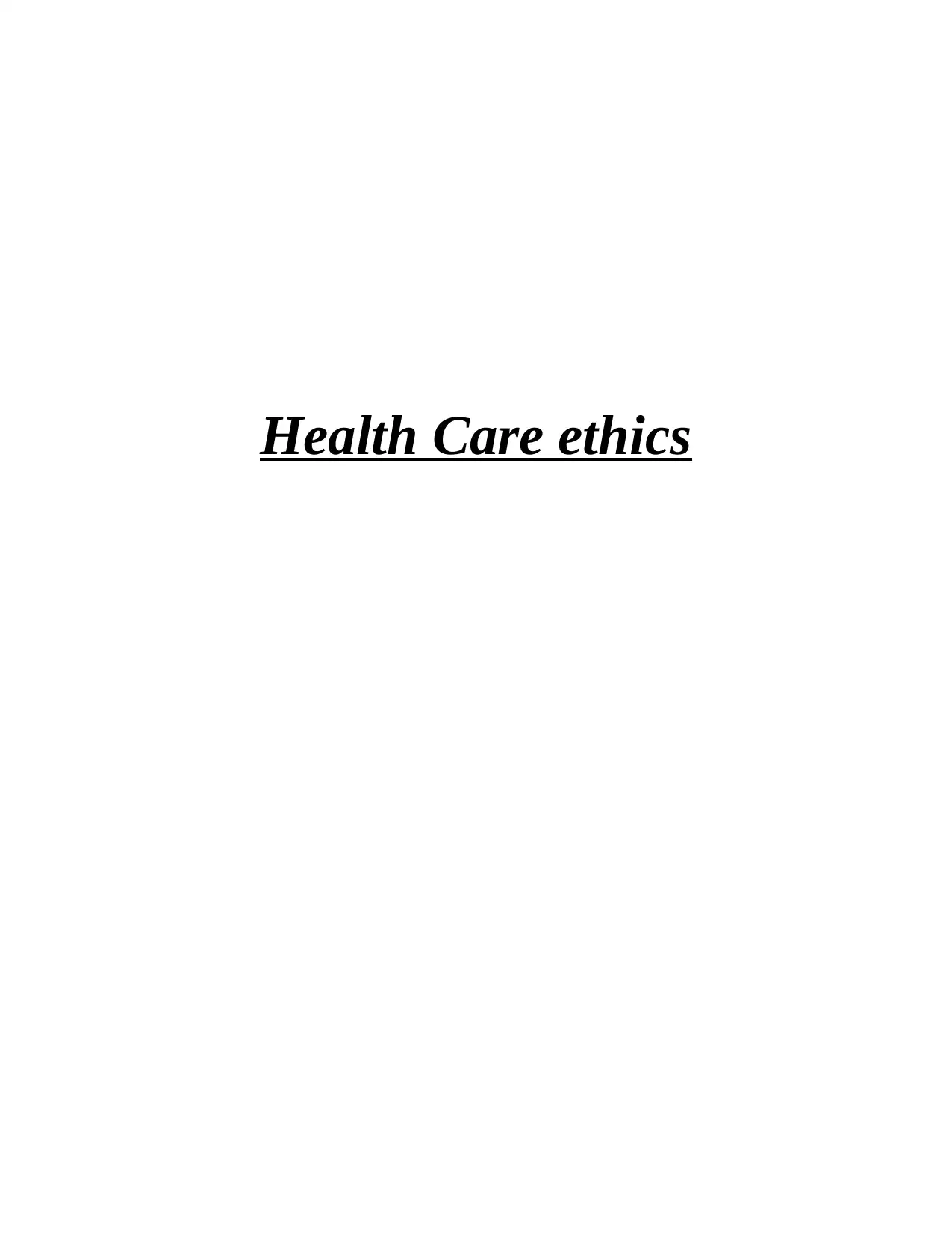
Health Care ethics
Paraphrase This Document
Need a fresh take? Get an instant paraphrase of this document with our AI Paraphraser

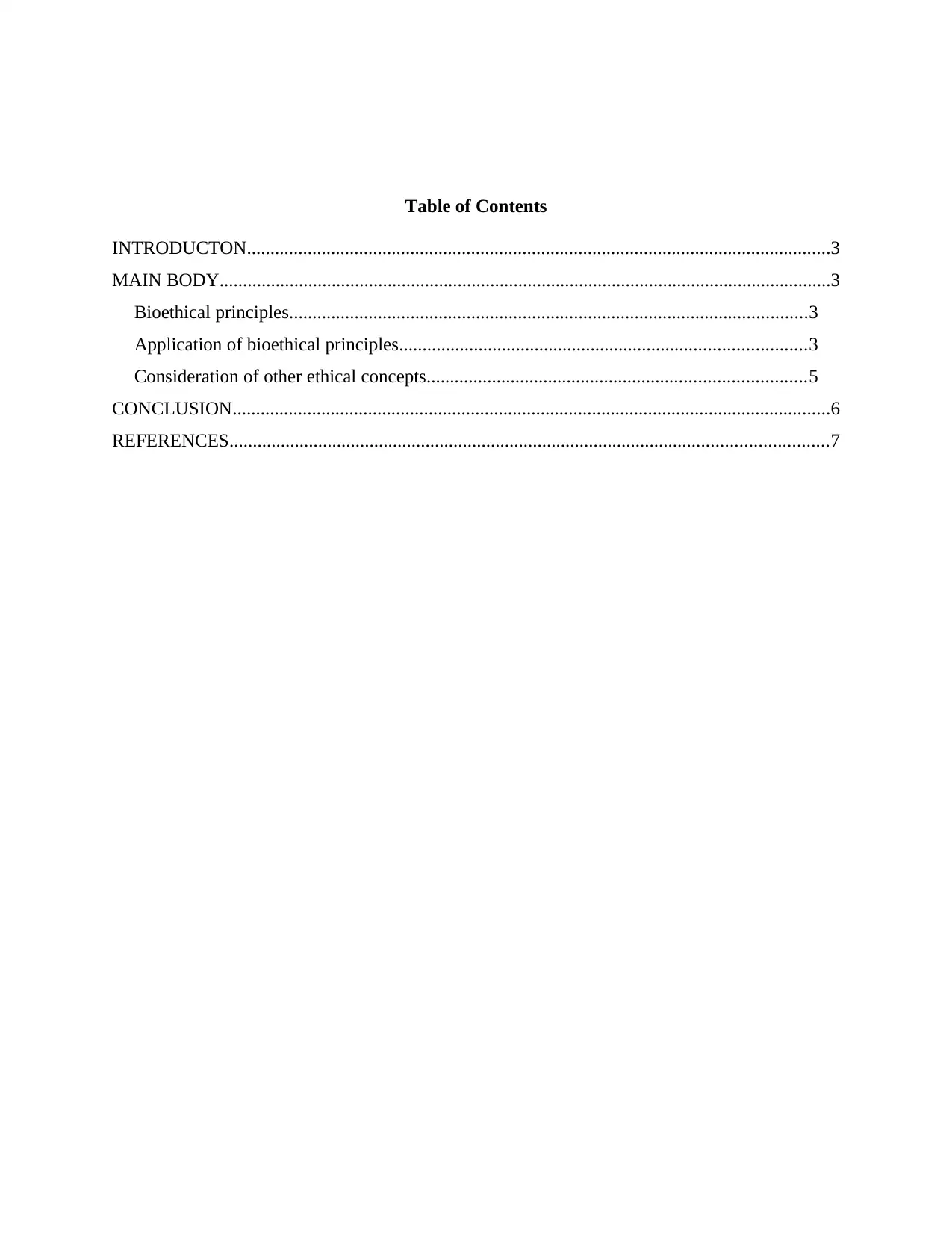
Table of Contents
INTRODUCTON.............................................................................................................................3
MAIN BODY...................................................................................................................................3
Bioethical principles...............................................................................................................3
Application of bioethical principles.......................................................................................3
Consideration of other ethical concepts.................................................................................5
CONCLUSION................................................................................................................................6
REFERENCES................................................................................................................................7
INTRODUCTON.............................................................................................................................3
MAIN BODY...................................................................................................................................3
Bioethical principles...............................................................................................................3
Application of bioethical principles.......................................................................................3
Consideration of other ethical concepts.................................................................................5
CONCLUSION................................................................................................................................6
REFERENCES................................................................................................................................7
⊘ This is a preview!⊘
Do you want full access?
Subscribe today to unlock all pages.

Trusted by 1+ million students worldwide
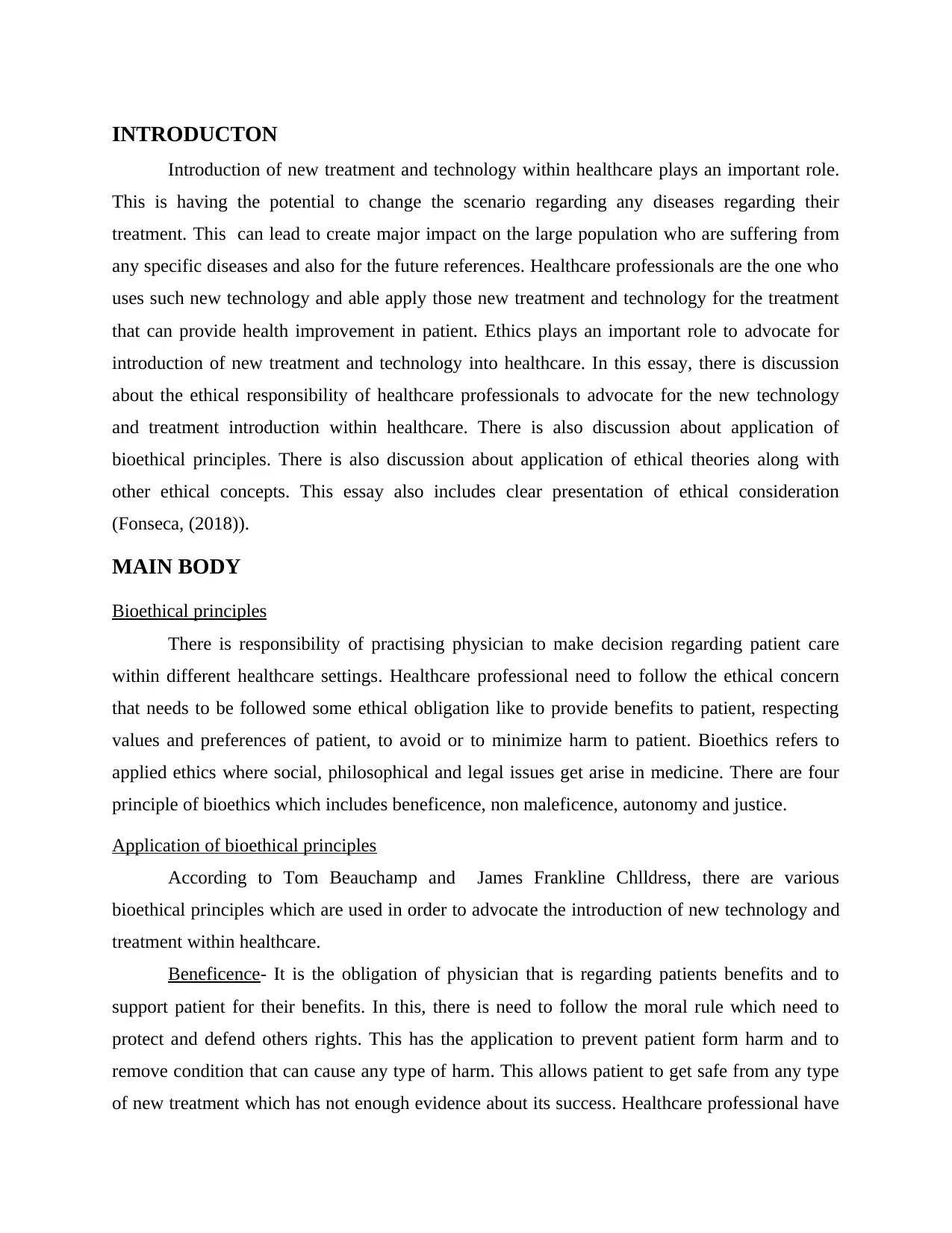
INTRODUCTON
Introduction of new treatment and technology within healthcare plays an important role.
This is having the potential to change the scenario regarding any diseases regarding their
treatment. This can lead to create major impact on the large population who are suffering from
any specific diseases and also for the future references. Healthcare professionals are the one who
uses such new technology and able apply those new treatment and technology for the treatment
that can provide health improvement in patient. Ethics plays an important role to advocate for
introduction of new treatment and technology into healthcare. In this essay, there is discussion
about the ethical responsibility of healthcare professionals to advocate for the new technology
and treatment introduction within healthcare. There is also discussion about application of
bioethical principles. There is also discussion about application of ethical theories along with
other ethical concepts. This essay also includes clear presentation of ethical consideration
(Fonseca, (2018)).
MAIN BODY
Bioethical principles
There is responsibility of practising physician to make decision regarding patient care
within different healthcare settings. Healthcare professional need to follow the ethical concern
that needs to be followed some ethical obligation like to provide benefits to patient, respecting
values and preferences of patient, to avoid or to minimize harm to patient. Bioethics refers to
applied ethics where social, philosophical and legal issues get arise in medicine. There are four
principle of bioethics which includes beneficence, non maleficence, autonomy and justice.
Application of bioethical principles
According to Tom Beauchamp and James Frankline Chlldress, there are various
bioethical principles which are used in order to advocate the introduction of new technology and
treatment within healthcare.
Beneficence- It is the obligation of physician that is regarding patients benefits and to
support patient for their benefits. In this, there is need to follow the moral rule which need to
protect and defend others rights. This has the application to prevent patient form harm and to
remove condition that can cause any type of harm. This allows patient to get safe from any type
of new treatment which has not enough evidence about its success. Healthcare professional have
Introduction of new treatment and technology within healthcare plays an important role.
This is having the potential to change the scenario regarding any diseases regarding their
treatment. This can lead to create major impact on the large population who are suffering from
any specific diseases and also for the future references. Healthcare professionals are the one who
uses such new technology and able apply those new treatment and technology for the treatment
that can provide health improvement in patient. Ethics plays an important role to advocate for
introduction of new treatment and technology into healthcare. In this essay, there is discussion
about the ethical responsibility of healthcare professionals to advocate for the new technology
and treatment introduction within healthcare. There is also discussion about application of
bioethical principles. There is also discussion about application of ethical theories along with
other ethical concepts. This essay also includes clear presentation of ethical consideration
(Fonseca, (2018)).
MAIN BODY
Bioethical principles
There is responsibility of practising physician to make decision regarding patient care
within different healthcare settings. Healthcare professional need to follow the ethical concern
that needs to be followed some ethical obligation like to provide benefits to patient, respecting
values and preferences of patient, to avoid or to minimize harm to patient. Bioethics refers to
applied ethics where social, philosophical and legal issues get arise in medicine. There are four
principle of bioethics which includes beneficence, non maleficence, autonomy and justice.
Application of bioethical principles
According to Tom Beauchamp and James Frankline Chlldress, there are various
bioethical principles which are used in order to advocate the introduction of new technology and
treatment within healthcare.
Beneficence- It is the obligation of physician that is regarding patients benefits and to
support patient for their benefits. In this, there is need to follow the moral rule which need to
protect and defend others rights. This has the application to prevent patient form harm and to
remove condition that can cause any type of harm. This allows patient to get safe from any type
of new treatment which has not enough evidence about its success. Healthcare professional have
Paraphrase This Document
Need a fresh take? Get an instant paraphrase of this document with our AI Paraphraser
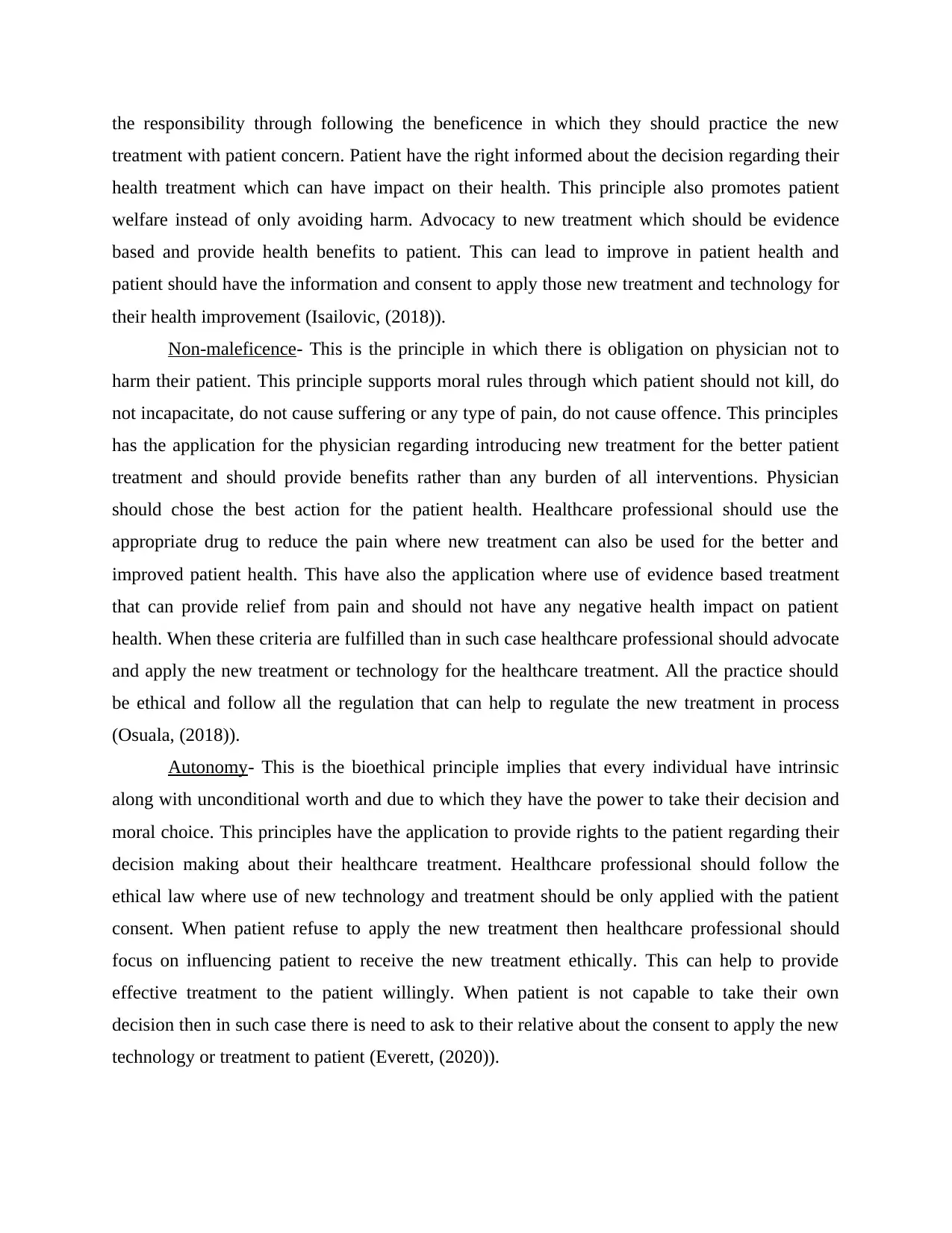
the responsibility through following the beneficence in which they should practice the new
treatment with patient concern. Patient have the right informed about the decision regarding their
health treatment which can have impact on their health. This principle also promotes patient
welfare instead of only avoiding harm. Advocacy to new treatment which should be evidence
based and provide health benefits to patient. This can lead to improve in patient health and
patient should have the information and consent to apply those new treatment and technology for
their health improvement (Isailovic, (2018)).
Non-maleficence- This is the principle in which there is obligation on physician not to
harm their patient. This principle supports moral rules through which patient should not kill, do
not incapacitate, do not cause suffering or any type of pain, do not cause offence. This principles
has the application for the physician regarding introducing new treatment for the better patient
treatment and should provide benefits rather than any burden of all interventions. Physician
should chose the best action for the patient health. Healthcare professional should use the
appropriate drug to reduce the pain where new treatment can also be used for the better and
improved patient health. This have also the application where use of evidence based treatment
that can provide relief from pain and should not have any negative health impact on patient
health. When these criteria are fulfilled than in such case healthcare professional should advocate
and apply the new treatment or technology for the healthcare treatment. All the practice should
be ethical and follow all the regulation that can help to regulate the new treatment in process
(Osuala, (2018)).
Autonomy- This is the bioethical principle implies that every individual have intrinsic
along with unconditional worth and due to which they have the power to take their decision and
moral choice. This principles have the application to provide rights to the patient regarding their
decision making about their healthcare treatment. Healthcare professional should follow the
ethical law where use of new technology and treatment should be only applied with the patient
consent. When patient refuse to apply the new treatment then healthcare professional should
focus on influencing patient to receive the new treatment ethically. This can help to provide
effective treatment to the patient willingly. When patient is not capable to take their own
decision then in such case there is need to ask to their relative about the consent to apply the new
technology or treatment to patient (Everett, (2020)).
treatment with patient concern. Patient have the right informed about the decision regarding their
health treatment which can have impact on their health. This principle also promotes patient
welfare instead of only avoiding harm. Advocacy to new treatment which should be evidence
based and provide health benefits to patient. This can lead to improve in patient health and
patient should have the information and consent to apply those new treatment and technology for
their health improvement (Isailovic, (2018)).
Non-maleficence- This is the principle in which there is obligation on physician not to
harm their patient. This principle supports moral rules through which patient should not kill, do
not incapacitate, do not cause suffering or any type of pain, do not cause offence. This principles
has the application for the physician regarding introducing new treatment for the better patient
treatment and should provide benefits rather than any burden of all interventions. Physician
should chose the best action for the patient health. Healthcare professional should use the
appropriate drug to reduce the pain where new treatment can also be used for the better and
improved patient health. This have also the application where use of evidence based treatment
that can provide relief from pain and should not have any negative health impact on patient
health. When these criteria are fulfilled than in such case healthcare professional should advocate
and apply the new treatment or technology for the healthcare treatment. All the practice should
be ethical and follow all the regulation that can help to regulate the new treatment in process
(Osuala, (2018)).
Autonomy- This is the bioethical principle implies that every individual have intrinsic
along with unconditional worth and due to which they have the power to take their decision and
moral choice. This principles have the application to provide rights to the patient regarding their
decision making about their healthcare treatment. Healthcare professional should follow the
ethical law where use of new technology and treatment should be only applied with the patient
consent. When patient refuse to apply the new treatment then healthcare professional should
focus on influencing patient to receive the new treatment ethically. This can help to provide
effective treatment to the patient willingly. When patient is not capable to take their own
decision then in such case there is need to ask to their relative about the consent to apply the new
technology or treatment to patient (Everett, (2020)).
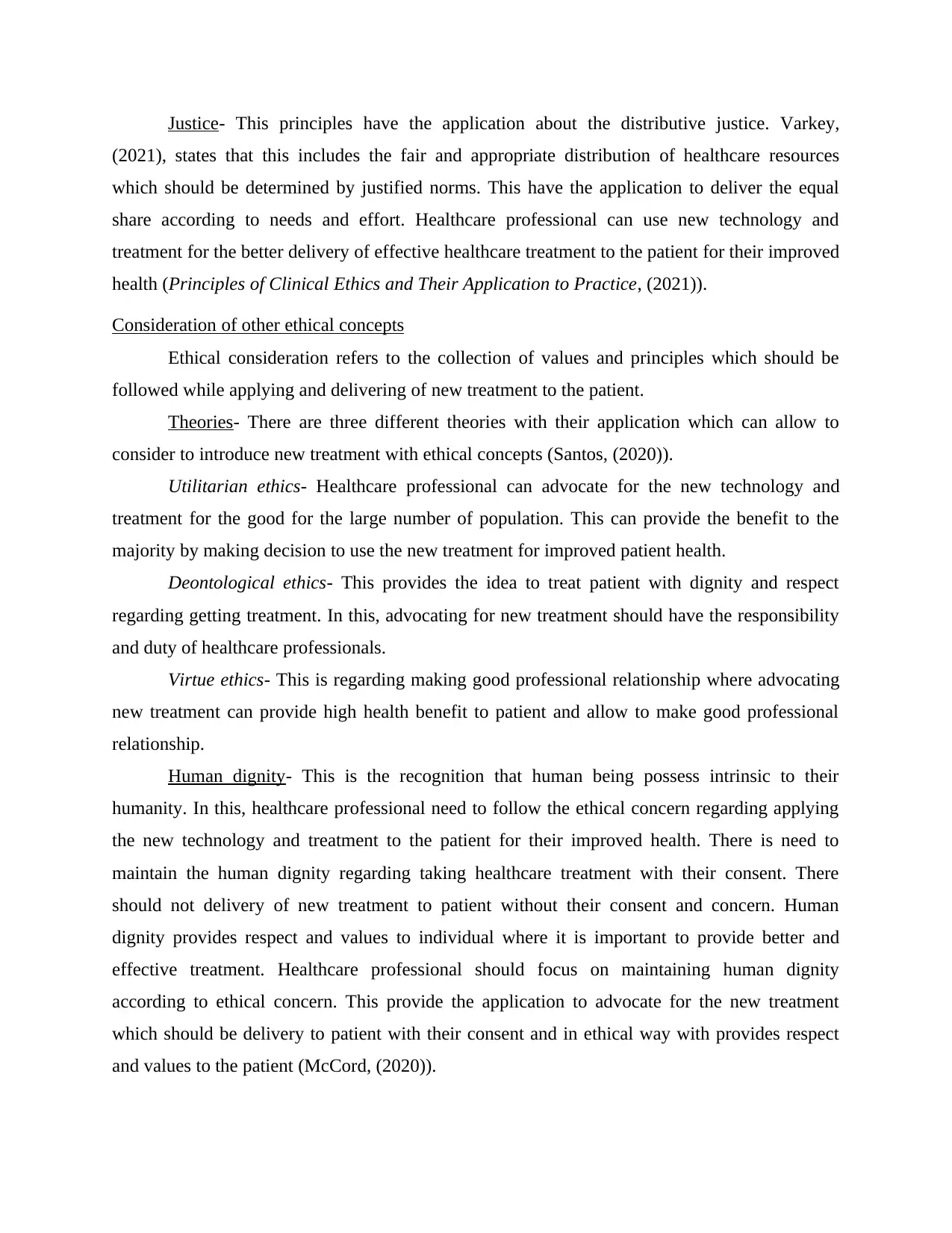
Justice- This principles have the application about the distributive justice. Varkey,
(2021), states that this includes the fair and appropriate distribution of healthcare resources
which should be determined by justified norms. This have the application to deliver the equal
share according to needs and effort. Healthcare professional can use new technology and
treatment for the better delivery of effective healthcare treatment to the patient for their improved
health (Principles of Clinical Ethics and Their Application to Practice, (2021)).
Consideration of other ethical concepts
Ethical consideration refers to the collection of values and principles which should be
followed while applying and delivering of new treatment to the patient.
Theories- There are three different theories with their application which can allow to
consider to introduce new treatment with ethical concepts (Santos, (2020)).
Utilitarian ethics- Healthcare professional can advocate for the new technology and
treatment for the good for the large number of population. This can provide the benefit to the
majority by making decision to use the new treatment for improved patient health.
Deontological ethics- This provides the idea to treat patient with dignity and respect
regarding getting treatment. In this, advocating for new treatment should have the responsibility
and duty of healthcare professionals.
Virtue ethics- This is regarding making good professional relationship where advocating
new treatment can provide high health benefit to patient and allow to make good professional
relationship.
Human dignity- This is the recognition that human being possess intrinsic to their
humanity. In this, healthcare professional need to follow the ethical concern regarding applying
the new technology and treatment to the patient for their improved health. There is need to
maintain the human dignity regarding taking healthcare treatment with their consent. There
should not delivery of new treatment to patient without their consent and concern. Human
dignity provides respect and values to individual where it is important to provide better and
effective treatment. Healthcare professional should focus on maintaining human dignity
according to ethical concern. This provide the application to advocate for the new treatment
which should be delivery to patient with their consent and in ethical way with provides respect
and values to the patient (McCord, (2020)).
(2021), states that this includes the fair and appropriate distribution of healthcare resources
which should be determined by justified norms. This have the application to deliver the equal
share according to needs and effort. Healthcare professional can use new technology and
treatment for the better delivery of effective healthcare treatment to the patient for their improved
health (Principles of Clinical Ethics and Their Application to Practice, (2021)).
Consideration of other ethical concepts
Ethical consideration refers to the collection of values and principles which should be
followed while applying and delivering of new treatment to the patient.
Theories- There are three different theories with their application which can allow to
consider to introduce new treatment with ethical concepts (Santos, (2020)).
Utilitarian ethics- Healthcare professional can advocate for the new technology and
treatment for the good for the large number of population. This can provide the benefit to the
majority by making decision to use the new treatment for improved patient health.
Deontological ethics- This provides the idea to treat patient with dignity and respect
regarding getting treatment. In this, advocating for new treatment should have the responsibility
and duty of healthcare professionals.
Virtue ethics- This is regarding making good professional relationship where advocating
new treatment can provide high health benefit to patient and allow to make good professional
relationship.
Human dignity- This is the recognition that human being possess intrinsic to their
humanity. In this, healthcare professional need to follow the ethical concern regarding applying
the new technology and treatment to the patient for their improved health. There is need to
maintain the human dignity regarding taking healthcare treatment with their consent. There
should not delivery of new treatment to patient without their consent and concern. Human
dignity provides respect and values to individual where it is important to provide better and
effective treatment. Healthcare professional should focus on maintaining human dignity
according to ethical concern. This provide the application to advocate for the new treatment
which should be delivery to patient with their consent and in ethical way with provides respect
and values to the patient (McCord, (2020)).
⊘ This is a preview!⊘
Do you want full access?
Subscribe today to unlock all pages.

Trusted by 1+ million students worldwide
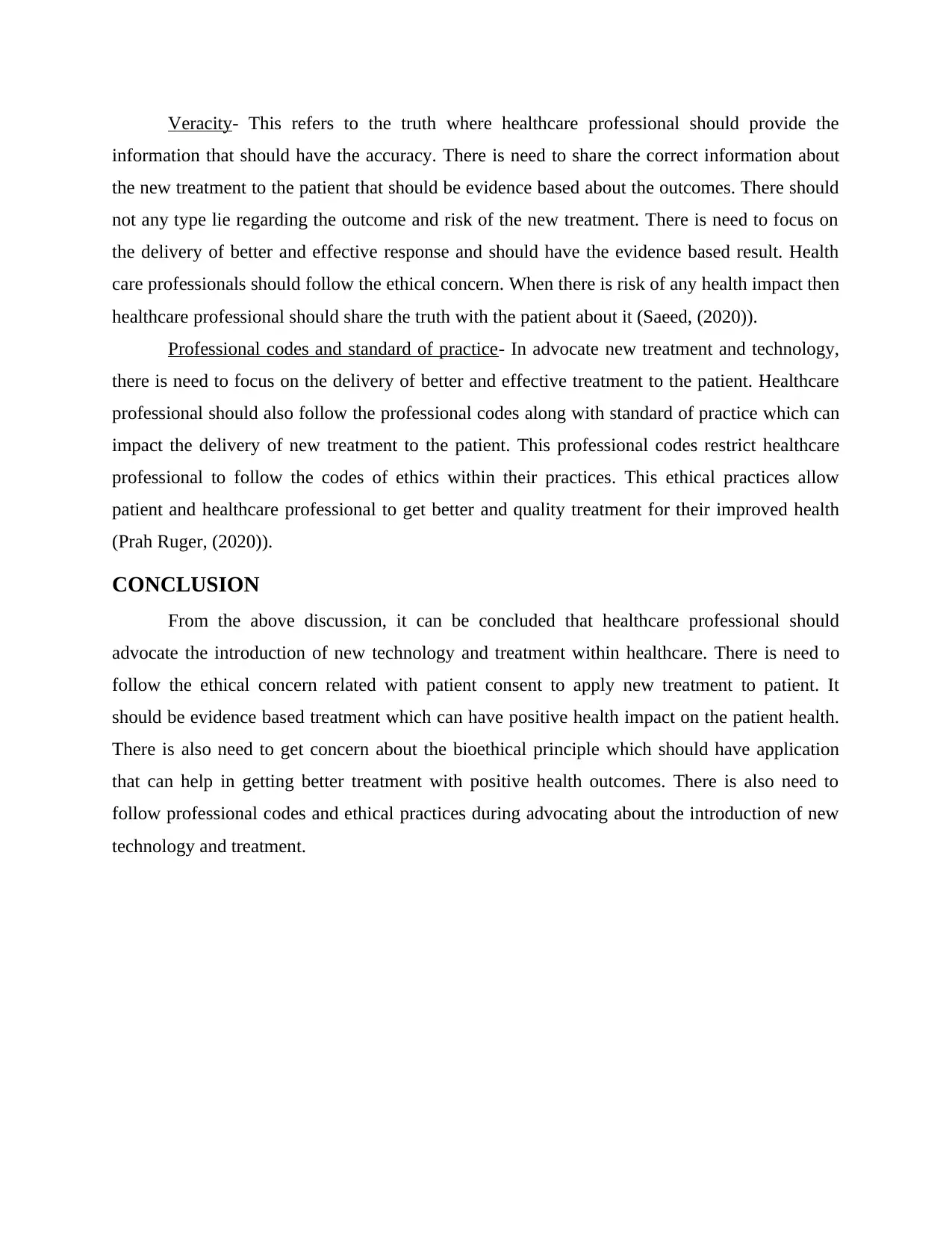
Veracity- This refers to the truth where healthcare professional should provide the
information that should have the accuracy. There is need to share the correct information about
the new treatment to the patient that should be evidence based about the outcomes. There should
not any type lie regarding the outcome and risk of the new treatment. There is need to focus on
the delivery of better and effective response and should have the evidence based result. Health
care professionals should follow the ethical concern. When there is risk of any health impact then
healthcare professional should share the truth with the patient about it (Saeed, (2020)).
Professional codes and standard of practice- In advocate new treatment and technology,
there is need to focus on the delivery of better and effective treatment to the patient. Healthcare
professional should also follow the professional codes along with standard of practice which can
impact the delivery of new treatment to the patient. This professional codes restrict healthcare
professional to follow the codes of ethics within their practices. This ethical practices allow
patient and healthcare professional to get better and quality treatment for their improved health
(Prah Ruger, (2020)).
CONCLUSION
From the above discussion, it can be concluded that healthcare professional should
advocate the introduction of new technology and treatment within healthcare. There is need to
follow the ethical concern related with patient consent to apply new treatment to patient. It
should be evidence based treatment which can have positive health impact on the patient health.
There is also need to get concern about the bioethical principle which should have application
that can help in getting better treatment with positive health outcomes. There is also need to
follow professional codes and ethical practices during advocating about the introduction of new
technology and treatment.
information that should have the accuracy. There is need to share the correct information about
the new treatment to the patient that should be evidence based about the outcomes. There should
not any type lie regarding the outcome and risk of the new treatment. There is need to focus on
the delivery of better and effective response and should have the evidence based result. Health
care professionals should follow the ethical concern. When there is risk of any health impact then
healthcare professional should share the truth with the patient about it (Saeed, (2020)).
Professional codes and standard of practice- In advocate new treatment and technology,
there is need to focus on the delivery of better and effective treatment to the patient. Healthcare
professional should also follow the professional codes along with standard of practice which can
impact the delivery of new treatment to the patient. This professional codes restrict healthcare
professional to follow the codes of ethics within their practices. This ethical practices allow
patient and healthcare professional to get better and quality treatment for their improved health
(Prah Ruger, (2020)).
CONCLUSION
From the above discussion, it can be concluded that healthcare professional should
advocate the introduction of new technology and treatment within healthcare. There is need to
follow the ethical concern related with patient consent to apply new treatment to patient. It
should be evidence based treatment which can have positive health impact on the patient health.
There is also need to get concern about the bioethical principle which should have application
that can help in getting better treatment with positive health outcomes. There is also need to
follow professional codes and ethical practices during advocating about the introduction of new
technology and treatment.
Paraphrase This Document
Need a fresh take? Get an instant paraphrase of this document with our AI Paraphraser
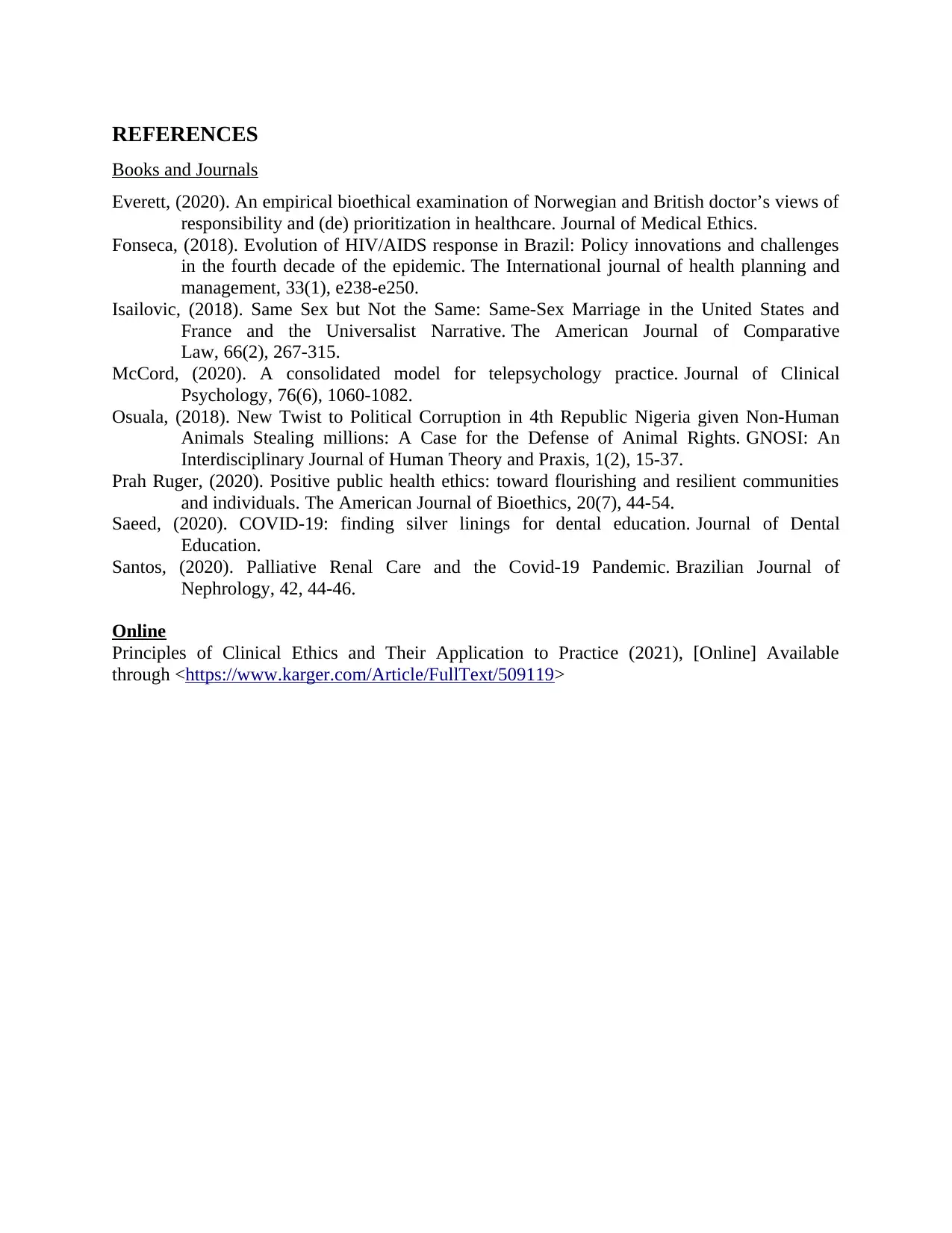
REFERENCES
Books and Journals
Everett, (2020). An empirical bioethical examination of Norwegian and British doctor’s views of
responsibility and (de) prioritization in healthcare. Journal of Medical Ethics.
Fonseca, (2018). Evolution of HIV/AIDS response in Brazil: Policy innovations and challenges
in the fourth decade of the epidemic. The International journal of health planning and
management, 33(1), e238-e250.
Isailovic, (2018). Same Sex but Not the Same: Same-Sex Marriage in the United States and
France and the Universalist Narrative. The American Journal of Comparative
Law, 66(2), 267-315.
McCord, (2020). A consolidated model for telepsychology practice. Journal of Clinical
Psychology, 76(6), 1060-1082.
Osuala, (2018). New Twist to Political Corruption in 4th Republic Nigeria given Non-Human
Animals Stealing millions: A Case for the Defense of Animal Rights. GNOSI: An
Interdisciplinary Journal of Human Theory and Praxis, 1(2), 15-37.
Prah Ruger, (2020). Positive public health ethics: toward flourishing and resilient communities
and individuals. The American Journal of Bioethics, 20(7), 44-54.
Saeed, (2020). COVID‐19: finding silver linings for dental education. Journal of Dental
Education.
Santos, (2020). Palliative Renal Care and the Covid-19 Pandemic. Brazilian Journal of
Nephrology, 42, 44-46.
Online
Principles of Clinical Ethics and Their Application to Practice (2021), [Online] Available
through <https://www.karger.com/Article/FullText/509119>
Books and Journals
Everett, (2020). An empirical bioethical examination of Norwegian and British doctor’s views of
responsibility and (de) prioritization in healthcare. Journal of Medical Ethics.
Fonseca, (2018). Evolution of HIV/AIDS response in Brazil: Policy innovations and challenges
in the fourth decade of the epidemic. The International journal of health planning and
management, 33(1), e238-e250.
Isailovic, (2018). Same Sex but Not the Same: Same-Sex Marriage in the United States and
France and the Universalist Narrative. The American Journal of Comparative
Law, 66(2), 267-315.
McCord, (2020). A consolidated model for telepsychology practice. Journal of Clinical
Psychology, 76(6), 1060-1082.
Osuala, (2018). New Twist to Political Corruption in 4th Republic Nigeria given Non-Human
Animals Stealing millions: A Case for the Defense of Animal Rights. GNOSI: An
Interdisciplinary Journal of Human Theory and Praxis, 1(2), 15-37.
Prah Ruger, (2020). Positive public health ethics: toward flourishing and resilient communities
and individuals. The American Journal of Bioethics, 20(7), 44-54.
Saeed, (2020). COVID‐19: finding silver linings for dental education. Journal of Dental
Education.
Santos, (2020). Palliative Renal Care and the Covid-19 Pandemic. Brazilian Journal of
Nephrology, 42, 44-46.
Online
Principles of Clinical Ethics and Their Application to Practice (2021), [Online] Available
through <https://www.karger.com/Article/FullText/509119>
1 out of 8
Related Documents
Your All-in-One AI-Powered Toolkit for Academic Success.
+13062052269
info@desklib.com
Available 24*7 on WhatsApp / Email
![[object Object]](/_next/static/media/star-bottom.7253800d.svg)
Unlock your academic potential
Copyright © 2020–2026 A2Z Services. All Rights Reserved. Developed and managed by ZUCOL.





